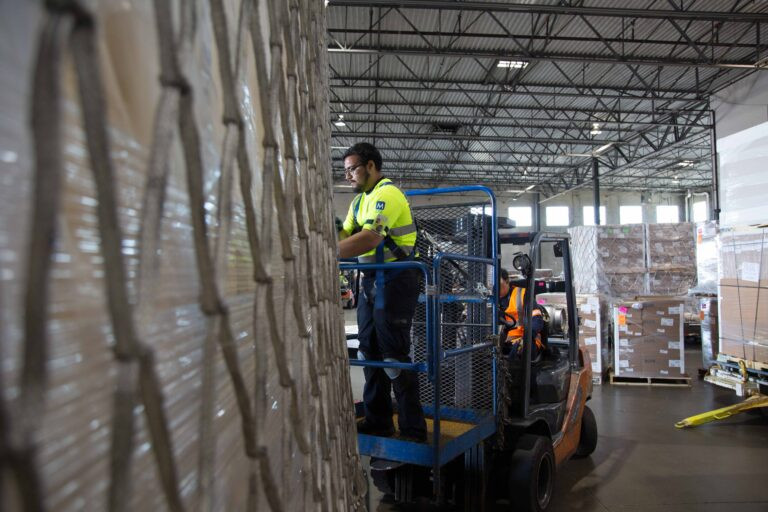Historically, the airfreight industry has been behind the curve when it comes to digitalisation. A combination of multiple stakeholders and the complexity of supply chains has made the development of industry-wide initiatives a constant challenge. The complex transition to electronic air waybills (eAWB) is a prime example of this.
However, any delays to digitalisation are no longer an option. From a recruitment and retention perspective, the logistics industry will not attract the next generation of talent if it continues to rely on technology developed 20 or even 30 years ago.
Optimising efficiency, simplification, and standardisation relies on harnessing the power of new technologies, including automation. More than ever, customers want consistency and transparency through better shipping visibility. This level of transparency will not be able to be delivered without digitalisation.
“The post-pandemic period has facilitated the drive towards innovation, but it is far from the sole driver,” Rory Fidler, Senior Vice President Cargo of Menzies Aviation, explained.
“It’s important to remember that the air cargo industry was both robust and nimble throughout the pandemic, quickly developing procedures to allow for the transportation of critical vaccines and other essentials.
“The pandemic had an empowering impact on the industry, fostering a greater enthusiasm for change and modernisation.”
Roll out
Last year, Menzies Aviation decided to replace its core cargo management system in tandem with the creation of a broader innovation programme. Following a rigorous Dragons’ Den-style appointment process, six different companies are now in the process of rolling out a series of cutting-edge solutions across the network.
For example, data intelligence company Dexory has provided Menzies Aviation with an autonomous robot that allows it to run a daily inventory check of its bonded areas. This provides it with a digital snapshot of the capacity usage at any one point in time and enables a precise analysis of longer-term trends.
Meanwhile, Menzies Aviation, in partnership with KCL, has digitalised its flight packs, meaning that stakeholders can recall paperwork electronically, reducing its carbon footprint. Meraki has collaborated with the handler to implement IP-based cameras, which will enable it to move from a reactive to a proactive security profile. Ricoh have improved printing capabilities and Zebra provide smart cabinets into multiple sites, while Speedcargo are working to optimise pallet builds.
“Deploying technical innovation at both the micro and macro level is crucial for providing the high level of visibility that customers rightly expect,” Fidler outlined.
“At the granular level, we are developing a service that will allow customers to track and trace their shipments in real time, obtain reports of our performance against the expected standards and run business intelligence across their shipments.
“To give customers a broader snapshot, we will let them access their own virtual control tower as part of the Menzies Aviation Cargo Handling (MACH) cargo management system application. This provides a live update of the flights and trucks on a traffic light-coded set of control boards, meaning that customers can concentrate on the exceptions rather than having to track every individual shipment.”
Spreading innovation
MACH will be rolled-out to 38 locations this year and a further 27 in 2025. The programme is broken into two streams: product development and network implementation.
Menzies Aviation’s product development team – who have 100 years of cargo management experience between them – will set the standards of the base product for each station which will then be agreed with the engineering team at Wipro.
Simultaneously, the network team will conduct a gap analysis at country level, and the results will be shared with the product development team. At this point, the product will be amended in line with specific local requirements, and if required, arrangements will be made with the local team to change their processes.
“Wipro has proven to be an extraordinarily effective partner. The scale and complexity of the programme that they are helping us to deliver is immense,” Fidler highlighted.
“Together, we have built, developed, evaluated and delivered MACH in just 13 months. We are continuing to develop the product while simultaneously rolling it out to 38 stations this year. This simply wouldn’t be possible without Wipro’s expertise and unrivalled capability.
“We are fortunate to have the unwavering support of the Menzies Board of Directors, our Global Head of Cargo and a range of key stakeholders. At a station level, we have had full buy-in from users, allowing us to roll out at both scale and speed. Their support and commitment to the MACH project specifically have been crucial to our success so far.
“In both the Menzies and Wipro teams, we’re lucky to have an incredibly committed internal team that is united in its determination to build something that has the potential to change our company and the air cargo industry for the better.”




